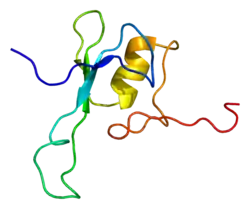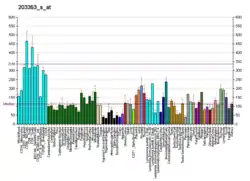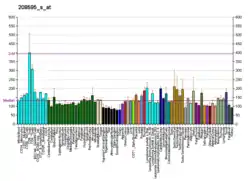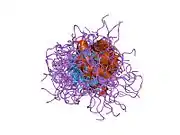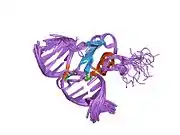MBD1
Methyl-CpG-binding domain protein 1 is a protein that in humans is encoded by the MBD1 gene.[5][6][7] The protein encoded by MBD1 binds to methylated sequences in DNA, and thereby influences transcription. It binds to a variety of methylated sequences, and appears to mediate repression of gene expression. It has been shown to play a role in chromatin modification through interaction with the histone H3K9 methyltransferase SETDB1. H3K9me3 is a repressive modification.
Function
DNA methylation is the major modification of eukaryotic genomes and plays an essential role in mammalian development. Human proteins MECP2, MBD1, MBD2, MBD3, and MBD4 comprise a family of nuclear proteins related by the presence in each of a methyl-CpG binding domain (MBD). Each of these proteins, with the exception of MBD3, is capable of binding specifically to methylated DNA. MECP2, MBD1 and MBD2 can also repress transcription from methylated gene promoters. Five transcript variants of the MBD1 are generated by alternative splicing resulting in protein isoforms that contain one MBD domain, two to three cysteine-rich (CXXC) domains, and some differences in the COOH terminus. All five transcript variants repress transcription from methylated promoters; in addition, variants with three CXXC domains also repress unmethylated promoter activity. MBD1 and MBD2 map very close to each other on chromosome 18q21.[7]
Interactions
MBD1 has been shown to interact with ATF7IP,[8] CBX5,[9][10] CHAF1A[10] and SUV39H1.[9]
References
- GRCh38: Ensembl release 89: ENSG00000141644 - Ensembl, May 2017
- GRCm38: Ensembl release 89: ENSMUSG00000024561 - Ensembl, May 2017
- "Human PubMed Reference:". National Center for Biotechnology Information, U.S. National Library of Medicine.
- "Mouse PubMed Reference:". National Center for Biotechnology Information, U.S. National Library of Medicine.
- Cross SH, Meehan RR, Nan X, Bird A (Jul 1997). "A component of the transcriptional repressor MeCP1 shares a motif with DNA methyltransferase and HRX proteins". Nat Genet. 16 (3): 256–9. doi:10.1038/ng0797-256. PMID 9207790. S2CID 23475072.
- Hendrich B, Abbott C, McQueen H, Chambers D, Cross S, Bird A (Sep 1999). "Genomic structure and chromosomal mapping of the murine and human Mbd1, Mbd2, Mbd3, and Mbd4 genes". Mamm Genome. 10 (9): 906–12. doi:10.1007/s003359901112. PMID 10441743. S2CID 819148.
- "Entrez Gene: MBD1 methyl-CpG binding domain protein 1".
- Fujita N, Watanabe S, Ichimura T, Ohkuma Y, Chiba T, Saya H, Nakao M (Apr 2003). "MCAF Mediates MBD1-Dependent Transcriptional Repression". Mol. Cell. Biol. 23 (8): 2834–43. doi:10.1128/MCB.23.8.2834-2843.2003. PMC 152570. PMID 12665582.
- Fujita N, Watanabe S, Ichimura T, Tsuruzoe S, Shinkai Y, Tachibana M, Chiba T, Nakao M (Jun 2003). "Methyl-CpG binding domain 1 (MBD1) interacts with the Suv39h1-HP1 heterochromatic complex for DNA methylation-based transcriptional repression". J. Biol. Chem. 278 (26): 24132–8. doi:10.1074/jbc.M302283200. PMID 12711603.
- Reese BE, Bachman KE, Baylin SB, Rountree MR (May 2003). "The Methyl-CpG Binding Protein MBD1 Interacts with the p150 Subunit of Chromatin Assembly Factor 1". Mol. Cell. Biol. 23 (9): 3226–36. doi:10.1128/MCB.23.9.3226-3236.2003. PMC 153189. PMID 12697822.
Further reading
- Maruyama K, Sugano S (1994). "Oligo-capping: a simple method to replace the cap structure of eukaryotic mRNAs with oligoribonucleotides". Gene. 138 (1–2): 171–4. doi:10.1016/0378-1119(94)90802-8. PMID 8125298.
- Suzuki Y, Yoshitomo-Nakagawa K, Maruyama K, Suyama A, Sugano S (1997). "Construction and characterization of a full length-enriched and a 5'-end-enriched cDNA library". Gene. 200 (1–2): 149–56. doi:10.1016/S0378-1119(97)00411-3. PMID 9373149.
- Hendrich B, Bird A (1998). "Identification and Characterization of a Family of Mammalian Methyl-CpG Binding Proteins". Mol. Cell. Biol. 18 (11): 6538–47. doi:10.1128/MCB.18.11.6538. PMC 109239. PMID 9774669.
- Ueba T, Kaspar B, Zhao X, Gage FH (1999). "Repression of human fibroblast growth factor 2 by a novel transcription factor". J. Biol. Chem. 274 (15): 10382–7. doi:10.1074/jbc.274.15.10382. PMID 10187827.
- Fujita N, Takebayashi S, Okumura K, Kudo S, Chiba T, Saya H, Nakao M (1999). "Methylation-Mediated Transcriptional Silencing in Euchromatin by Methyl-CpG Binding Protein MBD1 Isoforms". Mol. Cell. Biol. 19 (9): 6415–26. doi:10.1128/MCB.19.9.6415. PMC 84611. PMID 10454587.
- Ohki I, Shimotake N, Fujita N, Nakao M, Shirakawa M (2000). "Solution structure of the methyl-CpG-binding domain of the methylation-dependent transcriptional repressor MBD1". EMBO J. 18 (23): 6653–61. doi:10.1093/emboj/18.23.6653. PMC 1171728. PMID 10581239.
- Ng HH, Jeppesen P, Bird A (2000). "Active Repression of Methylated Genes by the Chromosomal Protein MBD1". Mol. Cell. Biol. 20 (4): 1394–406. doi:10.1128/MCB.20.4.1394-1406.2000. PMC 85293. PMID 10648624.
- Fujita N, Shimotake N, Ohki I, Chiba T, Saya H, Shirakawa M, Nakao M (2000). "Mechanism of Transcriptional Regulation by Methyl-CpG Binding Protein MBD1". Mol. Cell. Biol. 20 (14): 5107–18. doi:10.1128/MCB.20.14.5107-5118.2000. PMC 85960. PMID 10866667.
- Saito M, Ishikawa F (2002). "The mCpG-binding domain of human MBD3 does not bind to mCpG but interacts with NuRD/Mi2 components HDAC1 and MTA2". J. Biol. Chem. 277 (38): 35434–9. doi:10.1074/jbc.M203455200. PMID 12124384.
- Beyer KS, Blasi F, Bacchelli E, Klauck SM, Maestrini E, Poustka A (2002). "Mutation analysis of the coding sequence of the MECP2 gene in infantile autism". Hum. Genet. 111 (4–5): 305–9. doi:10.1007/s00439-002-0786-3. PMID 12384770. S2CID 16236528.
- Patra SK, Patra A, Zhao H, Carroll P, Dahiya R (2003). "Methyl-CpG-DNA binding proteins in human prostate cancer: expression of CXXC sequence containing MBD1 and repression of MBD2 and MeCP2". Biochem. Biophys. Res. Commun. 302 (4): 759–66. doi:10.1016/S0006-291X(03)00253-5. PMID 12646234.
- Fujita N, Watanabe S, Ichimura T, Ohkuma Y, Chiba T, Saya H, Nakao M (2003). "MCAF Mediates MBD1-Dependent Transcriptional Repression". Mol. Cell. Biol. 23 (8): 2834–43. doi:10.1128/MCB.23.8.2834-2843.2003. PMC 152570. PMID 12665582.
- Reese BE, Bachman KE, Baylin SB, Rountree MR (2003). "The Methyl-CpG Binding Protein MBD1 Interacts with the p150 Subunit of Chromatin Assembly Factor 1". Mol. Cell. Biol. 23 (9): 3226–36. doi:10.1128/MCB.23.9.3226-3236.2003. PMC 153189. PMID 12697822.
- Fujita N, Watanabe S, Ichimura T, Tsuruzoe S, Shinkai Y, Tachibana M, Chiba T, Nakao M (2003). "Methyl-CpG binding domain 1 (MBD1) interacts with the Suv39h1-HP1 heterochromatic complex for DNA methylation-based transcriptional repression". J. Biol. Chem. 278 (26): 24132–8. doi:10.1074/jbc.M302283200. PMID 12711603.
- Carney RM, Wolpert CM, Ravan SA, Shahbazian M, Ashley-Koch A, Cuccaro ML, Vance JM, Pericak-Vance MA (2003). "Identification of MeCP2 mutations in a series of females with autistic disorder". Pediatr. Neurol. 28 (3): 205–11. doi:10.1016/S0887-8994(02)00624-0. PMID 12770674.
- Georgel PT, Horowitz-Scherer RA, Adkins N, Woodcock CL, Wade PA, Hansen JC (2003). "Chromatin compaction by human MeCP2. Assembly of novel secondary chromatin structures in the absence of DNA methylation". J. Biol. Chem. 278 (34): 32181–8. doi:10.1074/jbc.M305308200. PMID 12788925.
- Watanabe S, Ichimura T, Fujita N, Tsuruzoe S, Ohki I, Shirakawa M, Kawasuji M, Nakao M (2004). "Methylated DNA-binding domain 1 and methylpurine–DNA glycosylase link transcriptional repression and DNA repair in chromatin". Proc. Natl. Acad. Sci. U.S.A. 100 (22): 12859–64. doi:10.1073/pnas.2131819100. PMC 240709. PMID 14555760.
